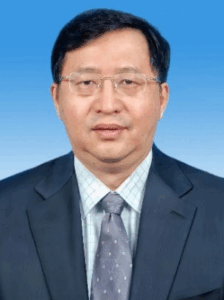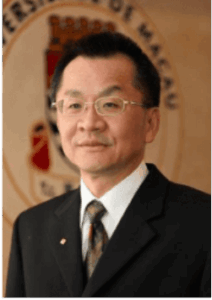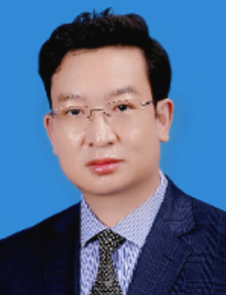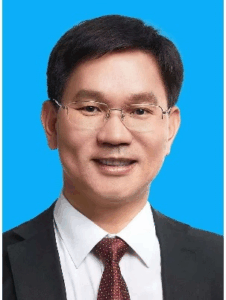KEYNOTE SPEAKERS

Prof. Li Deren
Li Deren, a photogrammetry and remote sensing scientist, is an academician of the Chinese Academy of Sciences, a senior academician of the Chinese Academy of Engineering, and an academician of the International Eurasian Academy of Sciences. He serves as the Director of the Academic Committee of Wuhan University, the Director of the Academic Committee of the State Key Laboratory of Information Engineering in Surveying, Mapping, and Remote Sensing, the Chairman of the Wuhan Association for Science and Technology, the Chief Scientist of Wuhan·China Optics Valley, and a recipient of the National Highest Science and Technology Award.

Prof. Qian Depei
Qian Depei, an academician of the Chinese Academy of Sciences, is a professor at the School of Computer Science and Engineering, Beihang University, and a Fellow of the China Computer Federation (CCF). Since 1987, Professor Qian has held various leadership roles, including Deputy Director and Director of the Department of Computer Science at Xi'an Jiaotong University, Vice Dean of the School of Electronic and Information Engineering, and Assistant to the President. In 1996, he became the Director of the Network and Information Center at Xi'an Jiaotong University. From 2015 to 2019, he served as Dean of the School of Computer Science and Engineering at Sun Yat-sen University. In 2021, he was elected as an academician of the Chinese Academy of Sciences.

Prof. Fang Binxing
Fang Binxing is a cybersecurity expert, academician of the Chinese Academy of Engineering, honorary director of the National Computer Network Emergency Response Technical Team/Coordination Center of China, and honorary dean of the Institute of Advanced Technology in Cyberspace at Guangzhou University. Professor Fang has long been engaged in research on network and information security technologies. In 1989, he began studying computer virus defense technologies and published the monograph Computer Viruses and Their Prevention in 1992. In the late 1990s, he focused on research related to intrusion detection for computer security incidents. In 1999, he proposed the concept of constructing national information security infrastructure and led the development of relevant systems, laying a solid technical foundation for safeguarding China's information security.

Prof. Tang Tao
Tao Tang, Academician of the Chinese Academy of Sciences, Fellow of the European Academy of Sciences, and Fellow of The World Academy of Sciences (TWAS), currently serves as Vice President of the Chinese Mathematical Society, President of Guangzhou Nanfang College, and Director of the Institute of Advanced Studies at Beijing Normal University-Hong Kong Baptist University United International College. Professor Tang's research primarily focuses on computational mathematics, including error analysis of numerical methods for hyperbolic equations, theoretical studies of spectral methods for differential equations, high-precision algorithms for phase-field models, and computational fluid dynamics.

Prof. Chen Junlong
Chen Junlong is a Foreign Member of the European Academy of Sciences, a Member of the European Academy of Sciences and Arts, and a Distinguished Chair Professor and Dean of the School of Computer Science and Engineering at South China University of Technology. Professor Chen serves as Vice President of the Chinese Association of Automation (CAA), Director of the Ministry of Education’s Engineering Research Center for Health Intelligence and Digital Parallel Humans, Director of the Guangdong Provincial Key Laboratory of Computational Intelligence and Cyberspace Information, Co-Chairman of the Guangdong Artificial Intelligence Industry Association, and Deputy Director of the Pazhou Lab. He is a Fellow of multiple prestigious institutions, including the IEEE, the American Association for the Advancement of Science (AAAS), and the International Association for Pattern Recognition (IAPR). He is also a Member of the Academia Europaea (European Academy of Sciences), the European Academy of Sciences and Arts, the Chinese Association of Automation (CAA), the Chinese Association for Artificial Intelligence (CAAI), and the Hong Kong Institution of Engineers (HKIE).

Prof. Yin Jian
Yin Jian is a Professor and Doctoral Supervisor at Sun Yat-sen University, where he currently serves as the Executive Vice Dean (acting Dean) of the School of Artificial Intelligence. He holds several key leadership roles, including Director of the Guangdong Provincial Key Laboratory of Big Data Analysis and Processing, Director of the Guangdong Provincial Engineering Research Center for Big Data Management and Application, and Director of the Guangzhou Key Laboratory of Supercomputing and Big Data. Prof. Yin is actively involved in academic and professional organizations, serving as a member of the Database Technical Committee and the Big Data Expert Committee of the China Computer Federation (CCF). He is also the Vice Chairman of the Guangdong Computer Society, Chairman of its Big Data Technical Committee, Vice Chairman of its Database Subcommittee, and Deputy Director of its Internet of Things Technical Committee. Additionally, he serves as the Editor-in-Chief of Information Engineering and Technology, the official journal of the Guangdong Computer Society.

Prof. Li Xiaoping
Li Xiaoping is a Professor and Doctoral Supervisor at Guangdong University of Technology, where he serves as the Dean of the School of Computer Science and Technology. Recognized as a national high-level talent, he has been honored as an Outstanding Young Scholar of the New Century by the Ministry of Education and appointed as a Distinguished Professor under the university’s "Hundred Talents Program." Holding the rank of Full Professor (Level 2), he also leads a National Key R&D Program of China as the Chief Scientist. Prof. Li is an IEEE Senior Member and a Distinguished Member of the China Computer Federation (CCF). He serves as the Vice Chair of the CCF Technical Committee on Collaborative Computing and as a Standing Committee Member of the Intelligent Simulation, Optimization, and Scheduling Committee under the Chinese Association for System Simulation (CASS). His research expertise spans intelligent computing, optimization algorithms, and collaborative systems, contributing significantly to advancements in computational intelligence and industrial applications.

Prof. Weng Jian
Huang Han is a Professor and Doctoral Supervisor at the School of Software Engineering, South China University of Technology. He has been honored with the Guangdong Outstanding Youth Science Fund and recognized as a Pearl River Science and Technology New Star by Guangzhou City. Additionally, he was selected among the first cohort of Guangdong Special Support Program for Young Top-Notch Talents in Science and Technology Innovation. Prof. Huang currently serves as the Deputy Director of the Guangdong Engineering Research Center for Face Recognition and the Secretary-General of the Software Engineering Technical Committee under the Guangdong Computer Society. Prior to his current roles, he worked as a Senior Research Assistant in the Department of Management Sciences at City University of Hong Kong. His research focuses on artificial intelligence, computer vision, and software engineering, with notable contributions to face recognition and intelligent systems.

Prof. Huang Han
Weng Jian is a Professor and Doctoral Supervisor, as well as a recipient of the National Science Fund for Distinguished Young Scholars. He currently serves as a Standing Committee Member of the Party Committee and Vice President of Jinan University. In his administrative role, Prof. Weng oversees graduate education, development planning, laboratory and equipment management, and IT infrastructure development. His responsibilities include supervising the Graduate School, the Development Planning Division (Higher Education Research and Evaluation Center), the Laboratory and Equipment Management Office, the Experimental Technology Center, the Network and Educational Technology Center, and the Computational Communication Research Center. He also liaises with the School of Physics and Optoelectronic Engineering (School of Engineering), the College of Information Science and Technology, the School of Cybersecurity, the Information Technology Research Institute, and the Guangdong Smart Education Research Institute.


